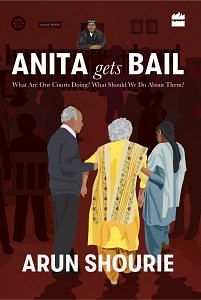Shourie’s ‘Anita Gets Bail’ is a damning indictment of the opaque and often inefficient manner in which our higher courts function, writes Maneesh Chhibber.
Arun Shourie wears many hats — editor, free-market reformer, politician, political thinker and author. But he is at his very best when telling a story. For only Shourie could have turned an inane subject such as the courts and what ails them into a page-turner, without bartering away the seriousness of the subject.
‘Anita Gets Bail’, his latest book, is a sad but eminently-readable account of the state of the Indian legal system. It also is a commentary, with notable examples, on several important issues that have brought disrepute to our judiciary, especially the higher courts, in recent years.
The semi-autobiographical book must be made compulsory reading for our lawmakers and judges — both present and the future so that they know what ails the Indian legal system. More importantly, when they do decide to do something about it, they can simply pick up the book and establish a standard operating procedure (SOP).
But I digress. The book’s title avers to Shourie’s wife Anita’s (only) brush with the torture that the Indian legal system is. Despite her poor health, Anita is called upon to visit a court in Haryana’s Faridabad for having allegedly evaded summons, which she never received. The summons, Shourie tells us, was issued for a house that they had never built on a piece of land that they didn’t own!
Towards the end of the chapter, Shourie suggests that his wife’s case should serve as a cue for a journalistic exercise — rather than focus “so much on lofty constitutional issues being debated in the Supreme Court,” media organisations, he writes, could depute correspondents once a month to a “randomly selected court” to report on what happens in that court in that day.
This, he says, would give readers and viewers a “so much truer picture of the state of justice in our country” and “may even spur some improvements”.
But the book is a damning indictment of the opaque and often inefficient manner in which our higher courts function. It also underlines the need to appoint better, more knowledgeable judges.
Citing judgments and cases decided by some of the judges, Shourie exposes, mainly through tongue-in-cheek wit, the ridiculousness that sometimes pervades our higher courts.
The chapter on (some of) the meandering judgments passed by a Himachal Pradesh High Court judge is a must-read as is the one on Calcutta High Court Judge C.S. Karnan, the only ever judge to be sent to jail for contempt of court.
His critique of the Supreme Court for being unable to get its own orders passed, in either several of the environment-related matters or police reforms, is well-timed, especially if one considers the amount of time our superior courts seem to be wasting on matters that have no public interest.
When he writes about the case about the delivery of Rs 15 lakh at the residence of a (then) Punjab and Haryana High Court judge Nirmaljit Kaur, which it later transpired was for another judge with the same name, Shourie is underlining the manner in which judges ensure that the wheels of justice — already infamous for moving at a snail’s pace — descend to a crawl.
Or the case of the death of former Arunachal Pradesh chief minister Kalikho Pul, who left behind a 60-page hand-written note, levelling serious allegations against the then CJI and his successor as well as several senior politicians of the Congress. However, no action has been taken suo motu either on the judicial side or the administrative side in the matter, despite several complaints by his widow.
Shourie reserves his best for his insightful reportage in writing about the manner in which the Supreme Court (mis)handled the case relating to the mysterious death of judge B.H. Loya, who was hearing the case relating to alleged fake encounter killing of Sohrabuddin Sheikh by the Gujarat Police. BJP president Amit Shah was among those accused of having engineered those encounters.
The sudden death of Loya, allegedly due to a heart attack, just 15 days before Shah was to appear before in his court, was first taken by the Bombay HC for an impartial inquiry. Later, after some petitions were filed in the Supreme Court, the matter was decided by the apex court, which ruled that there was nothing wrong in the death.
Loya’s death and the manner in which Chief Justice Dipak Misra assigned the case became a matter of controversy, with four senior-most SC judges even alluding to it at their unprecedented press conference where they spoke about issues confronting the higher judiciary.
“If this is how the judiciary handles the possible murder of one of its own, what protection can the average citizen hope for?” Shourie asks.
A question that the judiciary could have answered in its judgment — the case was still going on at the time he was giving finishing touches to the book, but didn’t. Or couldn’t?

Anita Gets Bail: What are our courts doing? What should we do about them? by Arun Shourie has been published by Harper Collins Publishers India




Congratulations to both Arunji for the book on topic effecting everyday a common man,and Anitaji for the bail she got from the relevant Court ,which provoked her husband for exposing the indian judicial system.